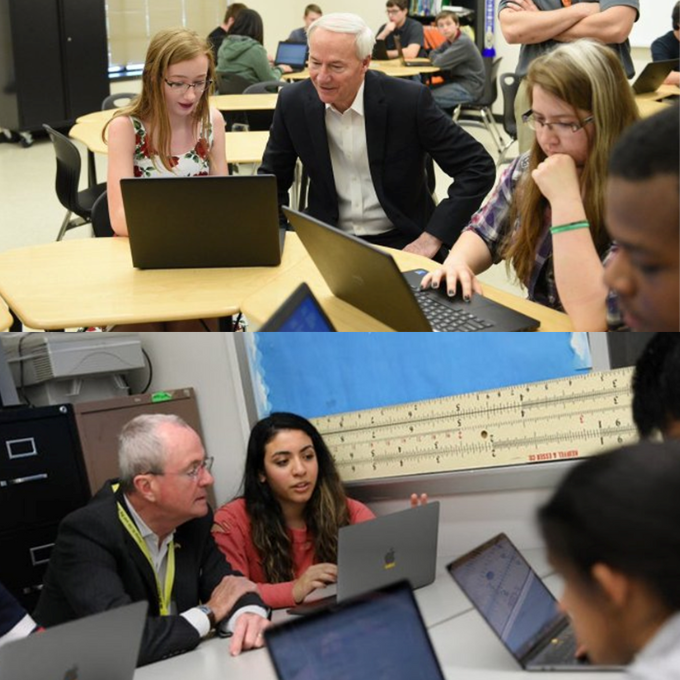Updates from the NGA Membership Team for June 2022. For more about the programs below and a list of upcoming events please email us at: membership@nga.org.
NGA Chairman’s Initiative
NGA Chairman Arkansas Governor Asa Hutchinson, along with Governors from five other states, gathered in Boston last month to discuss bipartisan strategies to bolster K-12 computer science education. The Governors were joined by private sector representatives, national experts and teachers for a meeting designed to advance Governor Hutchinson’s 2021-2022 NGA Chairman’s Initiative.
“Computer science education is critical to U.S. economic growth, competitiveness and security,” said Governor Hutchinson. “Governors from both parties are prioritizing computer science programs to teach students the skills they need to succeed both in school and in their future jobs.”
The following Governors attended the meeting:
- New Jersey Governor NGA Vice Chairman Phil Murphy
- Massachusetts Governor Charlie Baker
- New Hampshire Governor Chris Sununu
- North Carolina Governor Roy Cooper
- Vermont Governor Phil Scott
During the meeting, Governors shared updates on their states’ successes in expanding computer science education and discussed strategies and best practices with industry partners and other stakeholders – including CSforAll, Code.org, Computer Science Teachers Association (CSTA), Expanding Computing Education Pathways (ECEP) Alliance and Girls Who Code.
In a panel discussion on establishing computing career pathways, Governors talked with representatives from Amazon and Google about their programs to train and inspire students and teachers to build digital literacy skills connected to job opportunities. Governors also engaged with teachers and program facilitators involved in Girls Who Code programs.
To date, 25 Governors have signed on to the NGA Chairman’s Initiative for K-12 Computer Science Education Compact – pledging to continue to expand access to computer science classes for students in their states and territories.
Under Governor Hutchinson’s leadership, Arkansas has become a national leader in K-12 computer science education. Since 2015, the number of computer science students in Arkansas has jumped from 1,110 to over 13,000 – a 770% increase – while also driving a 1,300% increase in the number of girls and a 700% increase in the number of African-American students enrolled in computer science classes.
Governor Hutchinson first introduced his initiative in October 2021 at the National Press Club, and Governors previously met to discuss the initiative in Bentonville, Ark., in March. Governor Hutchinson will convene the final session of the yearlong initiative at NGA’s Summer Meeting in July 2022.
NGA kicked off the Chairman’s Initiative during a meeting held in Denver in August 2021, and Governor Hutchinson also highlighted his K-12 Computer Science Initiative during the NGA Winter Meeting.

Government Relations
NGA Chairman & Vice Chairman Send Letter to President Biden
NGA Chairman Arkansas Governor Asa Hutchinson and NGA Vice Chair New Jersey Governor Phil Murphy have sent a letter to President Biden advising him of the establishment of a bipartisan working group of six to ten Governors who will study and make recommendations designed to stop mass shootings and provide families confidence in the safety of their communities, and in particular, their schools.
Council of Governors Holds Intersession Meeting with Federal Partners
On Thursday, June 2, the Council of Governors, led by Minnesota Governor Tim Walz and Ohio Governor Mike DeWine, held the 13th Intersession Meeting with key federal partners. The Council discussed progress on priorities drafted and agreed upon at the Council Plenary Winter Meeting held in Washington, D.C.
In addition to Governors Walz and DeWine, Louisiana Governor John Bel Edwards, Oregon Governor Kate Brown, Utah Governor Spencer Cox, Vermont Governor Phil Scott and Wyoming Governor Mark Gordon participated in the event. Federal partners participating in the event were Deputy Secretary of Defense Kathleen Hicks, Deputy Secretary of Homeland Security John Tien, Homeland Security Advisor Dr. Liz Sherwood-Randall, Cybersecurity and Infrastructure Security Agency (CISA) Deputy Director Nitin Natarajan, Federal Emergency Management Agency (FEMA) Administrator Deanne Criswell, Assistant Secretary of Defense for Homeland Defense and Hemispheric Affairs Melissa Dalton, Department of Homeland Security (DHS) Assistant Secretary for Partnership and Engagement Eva Millona, Under Secretary of Defense for Personnel and Readiness Gil Cisneros and Deputy Assistant to the President and Director of Intergovernmental Affairs Julie Rodriguez.
Briefing on COVID-19 Emergency Declarations
On May 26, NGA’s Pandemic and Disaster Response Task Force held its first briefing in a series focused on the “Termination of Federal COVID-19 Emergency Declarations: Overview of National COVID-19 Emergency Declarations and Impacts on States and Territories.” As states and territories prepare for the eventual termination of federal and state COVID-19 emergency declarations, it is important for states and territories to understand the potential implications that these declarations have had on executive emergency powers to spend money and issue, suspend and alter regulations. This first briefing focused on providing an overview of the Public Health Emergency, the National Emergency Act and the Public Readiness and Emergency Preparedness Act (PREP). NGA was joined by James Hodge, Professor of Law at the Sandra Day O’Connor College of Law and Director of the Center for Public Health Law and Policy at Arizona State University, who provided an overview of these emergency declarations and the correlation with state emergency declarations and the flexibilities provided to states and territories. The meeting also included remarks from Matt Cowles, Deputy Director, National Emergency Management Association, who discussed continued federal/state/local disaster coordination and transitioning from emergency operational postures.
Task Force on Pandemic and Disaster Response Sends Priorities to Appropriations Committees
Connecticut Governor Ned Lamont and Tennessee Governor Bill Lee, Co-Chairs of the NGA Task Force on Pandemic and Disaster Response, have sent a letter to the leaders of the U.S. Senate and House Committees on Appropriations detailing priorities for the committees to consider as they begin crafting the Fiscal Year 2023 (FY23) appropriations bills.
The Governors’ letter focuses on issues the Pandemic and Disaster Response Task Force has jurisdiction over, including the Federal Emergency Management Administration (FEMA), National Guard, cybersecurity, healthcare, human services, immigration and COVID-19 response efforts. The Governors’ letter expresses continued support of predictable federal funding and flexibility in state-federal partnerships across these issue areas:
- Maternal & Child Health Services Block Grant
- Substance Abuse Prevention and Treatment Block Grant (SABG) and Community Mental Health Services Block Grants (MHBG)
- Child Care and Development Block Grant (CCDBG)
- Low-Income Home Energy Assistance Program (LIHEAP)
- Public Health Emergency Preparedness (PHEP) Cooperative Agreement
- Public Health Data Modernization Initiative
- State Opioid Response (SOR) grants
- Full-Time Support Positions for the National Guard
- Counterdrug Program
- Preparedness and Hazard Mitigation Grant Programs
- Homeland Security Grant Program (HSGP)
- Emergency Management Performance Grant (EMPG)
- Building Resilient Infrastructure and Communities (BRIC) Program
- State and Local Cybersecurity
Task Force on Community Renewal Sends Priorities to Appropriations Committees
Missouri Governor Mike Parson and Territory of the United States Virgin Islands Governor Albert Bryan, Co-Chairs of the NGA Task Force on Community Renewal, have sent a letter to the leaders of the U.S. Senate and House Committees on Appropriations detailing priorities for the committees to consider as they begin crafting the Fiscal Year 2023 (FY23) appropriations bills.
The Governors’ letter focuses on issues the Community Renewal Task Force has jurisdiction over, including education, workforce, housing, broadband, criminal justice, agriculture, and nutrition. The Governors’ letter expresses continued support of predictable federal funding and flexibility in state-federal partnerships across these issue areas:
- Preschool Development Grants (PDG)
- All programs under the Every Student Succeeds Act (ESSA) and Individuals with Disabilities Education Act (IDEA)
- School Based Mental Health Services Professional Demonstration Grants and the School Based Mental Health Services Grants
- State grants under the Perkins Career and Technical Education Act
- All programs under the Workforce Innovation and Opportunity Act (WIOA)
- Funding for Apprenticeships
- State Unemployment Insurance System Investment
- Farm Bill Programs Funding
- Support for Rural America
- Support Broadband Programs
- Funding for Affordable Housing Assistance
- Grants to State and Local Law Enforcement
Congressional Appropriations Work Underway
The U.S. House of Representatives set a $1.6 trillion budget limit for Fiscal Year 2023, launching summer appropriations work as spending leaders plan subcommittee markups this week on several of the 12 annual funding bills. The chamber automatically adopted the deeming resolution (H. Res. 1151-117), by approving a procedural measure to tee up debate on unrelated bills. The legislation sets a discretionary funding ceiling for fiscal 2023, which begins on October 1, matching President Joe Biden’s budget request.
U.S. House Passes Water Resources Development Act
The U.S. House of Representatives passed the Water Resources Development Act of 2022 on a bipartisan basis. The legislation authorizes the work of the U.S. Army Corps of Engineers (Corps), including critical water resources development projects and studies. Notably, the bill includes the authorization of new environmental infrastructure projects for the first time since 2007 and adds provisions for the Corps to address shoreline and coastal vulnerabilities. The Senate version of WRDA 2022 passed unanimously out of the Environment and Public Works Committee last month.
Governors Hutchinson and Murphy Urge Congress to Pass Bipartisan Innovation and Competition Legislation
NGA Chairman Arkansas Governor Asa Hutchinson and NGA Vice Chairman New Jersey Governor Phil Murphy have written an opinion piece published in The Hill urging passage of key elements of the Bipartisan Innovation and Competition Legislation under negotiation by U.S. House and Senate conferees.
“There is broad bipartisan support for priorities like increasing domestic production capacity for semiconductor research and development, strengthening intellectual property, and investing in regional technology hubs,” write Governors Hutchinson and Murphy. “Governors also share common ground on STEM education. Thousands of vital cybersecurity jobs are going unfilled due to a national cyber skills shortfall. There are multiple provisions before the conference committee to invest in STEM education — including scholarship funding to strengthen the pipeline of cyber talent in universities and community colleges.”
The Governors also write about the importance of investing in STEM and K-12 computer science education to bolster American competitiveness and security. “The same strategies we used to win the 20th century Space Race are essential to succeeding in the 21st century cyberspace race,” note Governors Hutchinson and Murphy. “Let’s safeguard American competitiveness and security by passing the Bipartisan Innovation and Competition Legislation — including investments in STEM education.”

North Dakota Governor Doug Burgum and Hawai‘i Governor David Ige Tout the Need to Invest in Computer Science Education
North Dakota Governor Doug Burgum and Hawai‘i Governor David Ige have written an opinion piece published in the Fargo Forum and the Honolulu Star Advertiser touting the work Governors are leading to invest in computer science education and underscoring the need for the United States to take further action to improve computer science education.
“As the Governors of North Dakota and Hawai‘i, we know all 50 states must focus on taking action to strengthen computer science education if we want to further technological advancements, bolster the future workforce, spur economic growth and protect ourselves from cybersecurity attacks,” write Governors Burgum and Ige.
The Governors detail some of the current challenges the United States faces, including the fact that only 51% of U.S. public high schools offer computer science education courses, and they account for some of the success stories taking place in their home states to help underscore the value of taking action. “We need to improve computer science education to create a brighter future for our children and country,” note Governors Burgum and Ige. “We have an imperative to invest time and energy toward these efforts as our national security depends on computer science and cybersecurity experts. It’s encouraging to see the growing bipartisan group of Governors coming together to improve computer science education. The successes we’re seeing in North Dakota and Hawai‘i reflect how smart policies can make significant progress, and we’re hopeful more American citizens, nonprofits and businesses will join efforts to invest in our future by improving computer science education.”

NGA Activities
States Meet for Annual Policy Summit on Outdoor Recreation
At the end of May, state leaders from across the nation gathered in Little Rock, Arkansas, to collaborate on policies to advance outdoor recreation. The Annual Policy Summit was organized through the National Governors Association’s (NGA) Outdoor Recreation Learning Network, which was launched in 2019 to help Governors and their outdoor recreation staff explore strategies to leverage unique natural, cultural and historical resources to help promote economic, health and environmental benefits.
“Arkansas is The Natural State, and our beautiful outdoor spaces are among our greatest assets,” said NGA Chairman Arkansas Governor Asa Hutchinson. “From hiking in the Ozark Mountains to fishing and floating our beautiful rivers to even digging your own diamond, Arkansas parks have something for everyone. I’m proud to celebrate the natural beauty of Arkansas and to join other states in working to cherish and enjoy the outdoor spaces that contribute so much to our health and economic well-being.”
Arkansas, Maryland and New Hampshire demonstrated their commitment by joining the Confluence of States – a bipartisan organization dedicated to advancing conservation and stewardship, education and workforce training, economic development and public health and wellness. The three new signatories bring the number of Confluence states to 16 – including Colorado, Maine, Michigan, Montana, Nevada, New Mexico, North Carolina, Oregon, Utah, Vermont, Virginia, Washington and Wyoming.
Governors across the country recognize the importance of this industry and are uniquely positioned to support its growth through state policies, programs and incentives.
NGA Releases New Commentary on Pre-Apprenticeship and Apprenticeship Programs
NGA has released the commentary States Bolster Transportation Workforce Through Apprenticeship Programs to provide an overview about the work NGA’s Center for Best Practices is doing with four states – Connecticut, Idaho, Oregon and North Carolina – to utilize the bipartisan Infrastructure Investment and Jobs Act (IIJA) funds to scale pre-apprenticeship and apprenticeship programs.
IIJA is providing Governors and their states and territories enhanced federal investment to offer work-based learning (WBL) opportunities to those seeking a job in the transportation workforce and other key infrastructure industries – expanding how funds for four multi-billion-dollar surface transportation programs can be used to support pre-apprenticeships and apprenticeships, among other WBL activities. At the virtual project launch meeting on June 1, officials from the U.S. Department of Transportation unveiled a new fact sheet on using highway funds for workforce development activities.
Eleven States to Participate in Workforce Project
The NGA Center for Best Practices (NGA Center), in partnership with Jobs for the Future (JFF), has launched a project to help Governors’ offices and other senior state officials better connect skills-based training to skills-based hiring practices and to consider promising design elements of Learning and Employment Record (LER) systems. Eleven states will participate in the project.
Named the Skills-Driven State Community of Practice, this peer learning opportunity will support states in preparing their employers, education and workforce systems, data systems and policies to design and implement digital wallet and LER projects as an economic mobility tool. States engaged are at varying stages of preparation to execute this work with the intention of moving forward in their efforts to build and strengthen state/regional LER systems.
The following states will participate in the project: Alabama, Arkansas, Colorado, Connecticut, Indiana, Kentucky, Louisiana, Oklahoma, Virginia, Washington and Wyoming.
NGA to Hold Next Generation of the Healthcare Workforce Learning Collaborative
NGA has released the new commentary State Efforts to Expand the Healthcare Workforce to highlight ways Governors have increased focus on the recruitment and retention of healthcare workers.
The commentary explores how COVID-19 has complicated the national issue of recruiting and retaining healthcare professionals, noting employment in healthcare is down 524,000 employees since February 2020, and about 16% of hospitals had critical staffing shortages as of October 2021.
In response to these trends, the piece highlights how Governors have celebrated the healthcare workforce and called for an increased focus on their recruitment and retention. The piece also details how the NGA Center for Best Practices will assist Governors in these efforts by leading the Next Generation of the Healthcare Workforce Learning Collaborative to bolster state health systems. This work draws upon the resources of the Healthcare Delivery and Postsecondary Education teams within the NGA Center to provide technical assistance around key workforce priority areas.
NGA Releases Commentary on Student Loan Borrowers
NGA has released a new commentary titled Governors Leading on Supporting Student Loan Borrowers. The piece explores how state initiatives to address student debt have taken several forms, such as programs offering financial assistance to borrowers made available through tax credits, refinancing regimes and direct repayment assistance for borrowers who meet certain eligibility criteria.
NGA Releases New Infrastructure Best Practices Report
NGA has released the publication Governors’ Initiatives to Enhance Planning, Delivery and Success Of Major Infrastructure Projects. The document serves as a reference guide to demonstrate how Governors are thinking about infrastructure investments holistically, organizing their administrations to yield success, building partnerships to leverage funding and financing, navigating and improving the procurement process and building a legacy of accomplishment and customer service. The paper sets out multiple best practice examples from across the United States and other jurisdictions and provides best practice observations from, and for, Governors, their staff and their agencies.
NGA Accepting Requests to Participate in State Equitable Recovery Coalition Action Lab
NGA, in partnership with Education Strategy Group, is now accepting requests for participation in its fourth in a series of Action Labs that are part of its State Equitable Recovery Coalition. The Action Labs are discrete learning opportunities that bring together state teams and national experts in a workshop setting to focus on actions to achieve a specific policy goal. This particular Action Lab will focus on state strategies for increasing quality pre-apprenticeships, which can help build basic math, literacy or other skills needed to succeed in an apprenticeship program.
A Day in History
June 17, 2021: President Joe Biden signed a bill to recognize Juneteenth as a federal holiday. Juneteenth is celebrated annually to mark the anniversary of June 19, 1865, the date enslaved Americans in Galveston, Texas, finally received word that they were free following President Abraham Lincoln’s January 1, 1863, signing of the Emancipation Proclamation. President Biden and Governors from across the country have also issued proclamations to recognize the Juneteenth National Independence Day.

Membership Programs
NGA Convening for Governors’ Staff Members in Indianapolis, Indiana
Last week, NGA held meetings for Governors’ staff members in Indianapolis. The convening was designed specifically for Governors’ deputy chiefs of staff, legislative directors and policy directors.
Earl Goode, chief of staff to Indiana Governor Eric Holcomb, welcomed meeting attendees. Staff members participated in meetings and breakout sessions designed to address challenges and solutions specific to their areas of expertise, including discussing best practices and learning unique and innovative ways to address today’s most pressing public policy challenges, with particular focus on the economy, energy and Infrastructure Investment and Jobs Act (IIJA) implementation.
Interested in attending a convening? Email membership@nga.org for a list of upcoming meetings.












